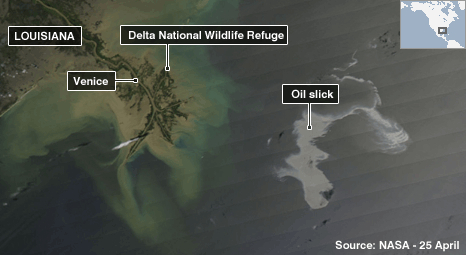Science News
Oil Spill, Bad to Worse
April 29, 2010

On April 20th, less than a month after President Obama announced the end of a decades-old ban on oil and gas drilling along much of the Atlantic coast and northern Alaska, a large oil rig in the Gulf of Mexico exploded. Two days later, on Earth Day, it sank, and according to the New York Times, “the riser pipe connecting the rig with the well it was drilling bent, broke and fell 5,000 feet to the sea floor. Oil is now escaping from that pipe at the open end and at two other points.”
Originally, it was estimated that 1,000 barrels (42,000 gallons) of oil per day were leaking. But because the depth of the leak made the oil difficult to detect, yesterday NOAA revised the amount to 5,000 barrels per day. Today, Homeland Security Secretary Janet Napolitano declared the spill to be of National Significance (meaning federal monies and assets can be used). Tomorrow, the spill is projected to reach the coast of Louisiana.
The situation has been going from bad to worse in less than a week and a half. And it’s likely to continue in that direction. The slick is now estimated to be 100 miles long and 30 miles wide.
Robots have been deployed to try and fix the leaks, so far with no luck. Cleanup crews have set fire to small portions of the spill, but with the winds and water-oil concentration, even this less-than-ideal solution cannot be used in full force. Other possibilities—a domed container to control the spill or a new rig to re-direct the oil—would not be in place for a few weeks.
According to Scientific American, “The area contains key wildlife habitats in the Pass-A-Loutre Wildlife Management Area and Breton National Wildlife Refuge on the Louisiana coast, which are teeming with nesting birds… The spill could be devastating for fishermen and oystermen who rely on estuaries and swamps along the Mississippi River for their livelihood.”
A spill like this one reminds us why alternatives to oil are needed. “This disaster should be a wake-up call to citizens and policy makers alike that the benefits of offshore increased oil drilling are far outweighed by the costs. We must move towards to 21st century solutions, increasing energy efficiency in every sector and transitioning to renewable energy,” according to Aaron Pope, the Academy’s Manager of Sustainability Programs.